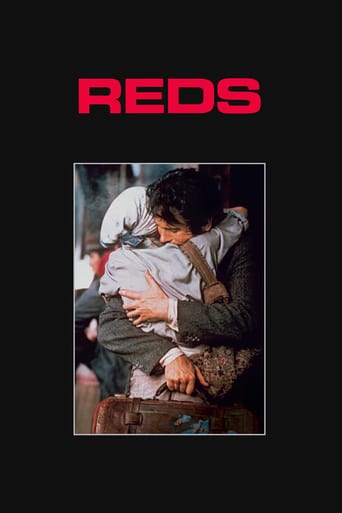moonspinner55
A personal triumph for co-writer-producer-director-star Warren Beatty, who won the Oscar for his direction and gives a cautious, interesting performance as early-1900s American journalist John Reed, who shared a tumultuous courtship and marriage to Louise Bryant (Diane Keaton), a socialite and self-described writer. Reed, a radical political activist, became intrigued with the Communist teachings of Russia and, with Bryant, defended the Bolsheviks and opposed American intervention. Their acquaintances, a community of activists and artists, included anarchist Emma Goldman (masterfully played by Oscar-winner Maureen Stapleton) and playwright Eugene O'Neill (Jack Nicholson), who also had a passionate affair with Bryant (one "guest witness" speculates the Reed-Bryant marriage was actually a menage a trois that included O'Neill). Beatty's film is too long at 195 minutes--and is far better in its early stages, so momentum tends to decrease as the story progresses--however, its an actors' paradise and everyone brings something special to the fore. Keaton's chattering sometimes feels anachronistic ("yeah, yeah...uh-huh, uh-huh"), but she works the camera mercilessly with her big, enchanting smile (to knock us dead) and sad, questioning stare. Keaton manages to translate her innermost thoughts into expressions, and her penetrating scenes with Nicholson are quietly-charged and fascinating, although her romance with Beatty's Reed feels somewhat muffled. Beatty, content to let his co-stars shine, has chosen to remain reserved; some may applaud the performance as successfully subtle, yet he might have shown us a bit more of his own personality (it would help in a three-hour-plus movie such as this). The epic-sized "Reds" is a strange melodrama, at times, and an overachiever, but with surprising humor in the mix and the fire of determination at its core. **1/2 from ****
lasttimeisaw
Warren Beatty's biographical saga about Jack Reed (1887-1920), a radical USA journalist, a fervent advocate of IWW (Industrial Workers of the World), and the author of TEN DAYS THAT SHOOK THE WORLD, running over 3 hours. REDS, scored 12 Oscar nominations (with 3 wins) and finally won Beatty an Oscar for BEST DIRECTOR among a combined 14 nominations throughout his eminent career so far (as actor, director, screen-writer and producer), undeniably can be reckoned as his most enterprising and taxing project, and is also notorious for its behind-the-scene stories such as Beatty's extravagant conceit in the director's chair and his off-screen romance with co-star Keaton (which ended right before the extended shooting days).Political elements aside, REDS quintessentially is an ode to the undying love between Jack Reed and his wife Louise Bryant (Keaton), also a radical journalist, since during most of its lengthy narrative, the latter is the unaltered focus of this epic and Beatty assiduously tells their relationship from her angle. Due to the similar political slant, they attract to each other almost instantly, when WWI edges to its end. But being labeled as an " exhibitionist" because of her feminist stance, Louise suffers from frustration to be taken seriously for her work as a writer and abetted by Jack's constant absence due to his job, she starts off a romance with Eugene O'Neill (Nicholson, who steals the limelight assertively with his trenchant dissection of their ménage à trois), the Nobel laureate playwright and their common friend, in spite of their vastly conflicting political standings. Things go downhill after they get married when monogamy stands in the way of their life, selfishly and immaturely Louise uses Eugene to get back at Jack, only to be taken aback by Jack's philandering notion of partnership.They separate for a while, until in 1917, the Bolshevik Revolution, becomes the essential catalyst of their undimmed love, witnessing the revolution in the front row, and realising what a sea change their Socialist belief can make in the war-trodden foreign land, they work shoulder-to-shoulder as comrades, write first-hand reports of the revolution and return to USA with an evolutionarily reshaped prospect of life, which is also where their political ideologies diverge.Jack passionately throws himself into politics, to bring Communism to his native soil, against the widespread fear that it would also usurp the democratic government of United States, whereas Louise hold a different opinion towards the issue, as she claims, she is deeply inspired by the Russian revolution and how proletariat can stand up and takes the regime, but she is also clear- minded about the fact that it is completely another situation for socialism to bloom here in America. Soon the schism emerges in the budding but vulnerable socialist party, their love is under another critical test when Jack defies Louise's advice and accepts the assignment to go to Moscow and seek endorsement from Grigory Zinoviev (acclaimed writer Kosinski in his first film role) for his party. His journey turns out to be a disaster, he is briefly incarcerated in Finland and then as an exchanged hostage, he stays with the communist party in Russia and stands for a mouthpiece of the socialism in USA, but soon grows increasingly disillusioned with Zinoviev's policies, meanwhile his health deteriorates drastically, a final reunion with Louise seems to be an immense mercy for him.Beatty painstakingly interposes interviews of more than thirty real-life "witnesses" who personally know Jack and Louise into the chronicle account, sometimes as a voice-over juxtaposing with the story, offering sound-bites and tidbits to enrich our perspectives of them and a larger social background at then. The documentary approach is quite risky, not only it adds considerable length to the already protracted magnitude, it also takes a chance with a more elaborate editing process in the post-production, how come it failed to nab the editing trophy in the Oscar?REDS received four acting nominations in four categories, firstly, Beatty is apparently too old for the role (Reed dies at the age of 33, while Beatty was already over 40 during the filming), but if one is not familiar with the archetype, his very sympathetic portrayal is fairly engaging, we can feel for Jack's idealistic enthusiasm, his intense affection to Louise (there are at least three sex scenes to prove his prowess, even after he loses one kidney), and the root of his tragedy - his erudite perception of the society fatally conflicts with his simplistic modus operandi. Keaton, by comparison, really busts her chops to embody Louise as a flawed but flesh-and-blood human being, sometimes she is wilful, vexatious, self-contradictory, other times, she is lucid, gallant and endearing, all reflect from her imperfect visage, this is her best dramatic performance to date.As charismatic as Nicholson, the only Oscar winner among the quartet is Maureen Stapleton, finally paid her due for her fourth attempt in the category, she plays Emma Goldman, the no bullshit anarchist, whose limited presence seems rather paltry against the film's duration, and she is not even a key player in the game, but whenever she is on the screen, Stapleton seizes every opportunity to remind viewers of her progressive thinking and truculent spirit, all intrigues us to know her character more, when will be a biography film about her? Emma Thompson can nail that role. All in all, this film is an important cinematic legacy which conducts a non-judgmental and thorough account on a highly contentious topic at a tumultuous time through the lives of Jack and Louise, a commendable extravaganza, probably Beatty's best work in any aspect, and I have a taxi waiting, now...
paul vincent zecchino
Why watch this chunk of celluloid trash? Because it will help you to understand why so many otherwise intelligent people still fall for the false religion of looting and genocide known as socialism/communism.The 'interviews' with 'survivors' - a polite way of describing decrepit 20s anarchists - who gas off about the virtues of communism is enlightening and chilling. These mindwashed dupes tell you communism is peachy keen but for some strange reason don't mention firing squads, brainwashing, gulags, hanging people on meathooks in the basement of Lubyanka Prison, the Holodmor Famine in the Ukraine, contaminated drinking water, filth, corruption, beatings, true environmental disasters, and other routine features of communist third world toilets.Ask anyone in Cuba, North Korea, or communist china - that's right I said it, 'communist china' - about the lovely paradise of the workers. Take a look at these interviewees: old before their time, raspy cigarette voices, lousy teeth, chicken skin: don't you want to be a commie just like them? Yeah. Can't wait.They're just bright enough to be dangerous and all they can do when not throwing bombs is lie, lie, lie, and thrust their dirty fists in the air in worship of marx, lenin, stalin and other human garbage who would repay their moronic loyalty with death.You like stereotypes? Then you gonna love Reds. It has more stereotypes than a Chernobyl junkyard dog has three headed fleas: anti-communists are either stupid and toothless or 'rich, white' arrogant toffs. The communist rats are all lovely, wonderful, smart people who are always partying and enjoying life.Which doesn't explain why they croak of easily avoidable fatal illnesses at unusually young ages.To understand diseases, medical researchers must examine chunks of wino vomit, fly eggs, body lice, open lesions, necrotic tissue, decomposed bodies, and similar dumbfounding, unsavory artifacts.Thus is the case with Reds, a film which was clearly hastily cobbled in reaction to the election of President Reagan, who gave Americans the best eight years they'd enjoyed in years, and since for that matter.The Left is a pack of sore losers and horrible, vindictive winners. This is an anti-Reagan film which slyly attempts to sell communism to anyone stupid enough to buy it.Within a decade of this film's release, the soviet union collapsed of its own weight.Study this as you would a crime scene or a bacterial strain in a Petri Dish: to prevent future outbreaks of the genocidal disease of communism.Paul Vincent ZecchinoManasoviet Key, Florida17 July, 2013




